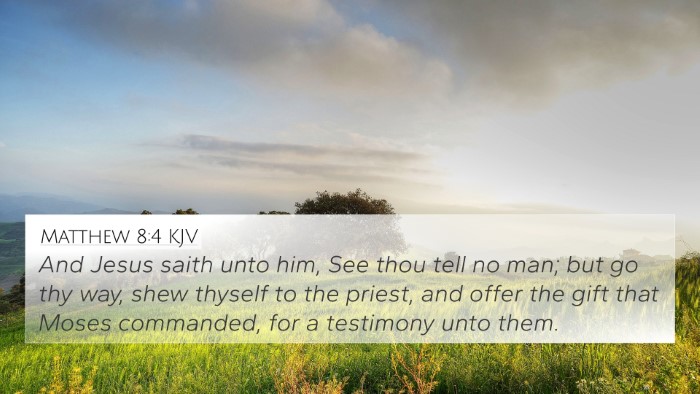Understanding Mark 8:26
Mark 8:26 states: "And he sent him away to his house, saying, Neither go into the town nor tell it to any in the town." This verse illustrates the profound lessons of discretion, faith, and the purposefulness of Jesus' actions. Through the insights from esteemed public domain commentaries like those of Matthew Henry, Albert Barnes, and Adam Clarke, we can better comprehend the underlying meanings.
Summary of Mark 8:26
This verse encapsulates a pivotal moment where Jesus performs a healing miracle. However, instead of seeking public acknowledgment or glorification, Jesus instructs the healed man to refrain from returning to the village and sharing details of the miracle.
Commentary Insights
-
Matthew Henry's Commentary:
Henry emphasizes the importance of privacy concerning spiritual matters. He explains that Jesus' instructions were not only to avoid stirring public curiosity but also to safeguard the man’s personal faith journey. It reflects Jesus' intention of preventing the misinterpretation of His miracles as mere wonders.
-
Albert Barnes' Commentary:
Barnes discusses the significance of obedience in this narrative. He points out that the man was not merely healed but was also instructed on how to live post-healing. The command not to return to the town signifies the need to focus on the spiritual renewal the healing symbolizes rather than becoming entangled in the expectations or scrutiny of society.
-
Adam Clarke's Commentary:
Clarke highlights the connection between faith and privacy in this account. He asserts that Jesus often commands silence following miracles, which can reflect a deeper reality of understanding personal faith versus public perception. It shows that the man's healing was not to be considered a spectacle but a profound personal experience.
Connections Between Bible Verses
Mark 8:26 resonates with several themes found in the Bible, establishing a network of related verses. Here are some cross-references that deepen our understanding:
- Matthew 9:30 - "And their eyes were opened; and Jesus strictly charged them, saying, See that no man know it." - This verse similarly depicts Jesus instructing the healed to maintain confidentiality.
- Mark 1:44 - "And saith unto him, See thou say nothing to any man..." - Reflects a recurring theme of Jesus' discretion after performing miracles.
- Luke 5:14 - "And he charged him to tell no man..." - Further emphasizes the importance of faith over public testimony.
- Matthew 12:16 - "And charged them that they should not make him known." - Again, indicating the principle of guarding Jesus' mission and identity.
- John 6:15 - "When Jesus therefore perceived that they would come and take him by force, to make him a king, he departed again into a mountain himself alone." - Deals with Jesus’ awareness of public perception and His retreat from it.
- Mark 7:36 - "And he charged them that they should tell no man..." - This illustrates similar instructions given to people after a healing.
- John 10:32 - "Many good works have I shewed you from my Father; for which of those works do ye stone me?" - This highlights the relationship between Jesus' works and public perception.
Thematic Bible Verse Connections
The themes present in Mark 8:26 can also link to broader biblical concepts:
- Discretion in Faith: The necessity of keeping personal faith experiences intimate.
- Understanding Jesus' Mission: Insights are drawn from Jesus’ life which reflect His purpose beyond popularity.
- Obedience in Healing: An exploration of how divine interventions come with divine expectations.
Insights from Comparative Bible Verse Analysis
Through comparative Bible verse analysis, we can see how Mark 8:26 plays a role in a broader narrative of Jesus’ ministry and His teachings about humility, faith, and understanding of God's plan.
From the study of themes, contexts, and inter-Biblical dialogue surrounding this verse, we extract valuable lessons for contemporary faith practices.
Conclusion
Mark 8:26 serves as a powerful reminder of the importance of personal faith journeys and the discretion that sometimes accompanies significant spiritual experiences. By engaging with tools for Bible cross-referencing, individuals can explore these themes further and deepen their understanding of scripture and its application in their lives.








